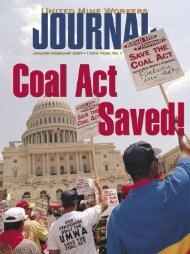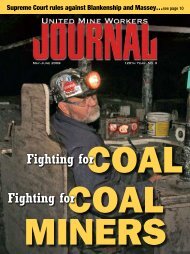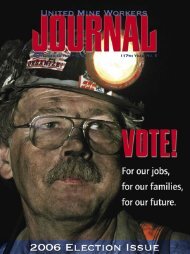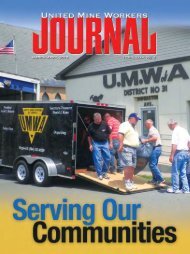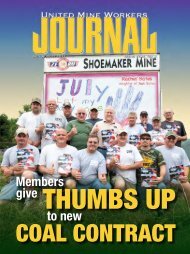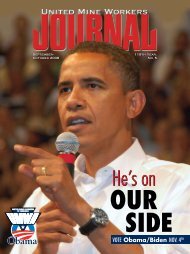March - April - United Mine Workers of America
March - April - United Mine Workers of America
March - April - United Mine Workers of America
- No tags were found...
Create successful ePaper yourself
Turn your PDF publications into a flip-book with our unique Google optimized e-Paper software.
PhIl SMIThwhose history <strong>of</strong> underground conditionsindicated a significant number<strong>of</strong> violations and/or bad conditions,such as problems relating to methaneaccumulations, ventilation practices,rock dust applications and inadequatemine examinations. As many as 10inspectors were sent to the minesidentified for enhanced inspections.The company most affected byMShA’s more aggressive enforcementactions was Massey Energy, whichhad seven mines targeted in the initialinspection blitz. Indeed, Massey led allU.S. coal companies in fines assessedin 2010 with $17.4 million. ConsolEnergy was second at just over $8million. Massey also had the highestnumber <strong>of</strong> significant and substantialSection 104 citations, with 4,199.The labor Department in 2009withdrew the Bush administration’sproposed rule governing the department’sassessments <strong>of</strong> occupationalhealth risks. The Bush rule wouldhave required DOl agencies to issuean advance notice <strong>of</strong> proposed rulemakingas a first step in developinghealth standards regulating workplaceexposure to toxic substancesor hazardous chemicals. This wouldhave crippled the rulemaking processfor OShA and MShA by slowingthe process down and would haverequired objective criteria not relatedto health and safety concerns.MShA has also taken steps to ad-dress the enormous backlog <strong>of</strong> chal-lenges to citations and penalties thatare effectively making enforcement allbut impossible. Operators frequentlyfile challenges in order to delay oravoid a final order that could show a“pattern <strong>of</strong> violations,” thus deferringor avoiding higher penalties.forWArd progress“MShA has taken several stepsforward but there is still much todo,” said President Roberts. “For somany years, the policies and staffing<strong>of</strong> the agency were dominated bythe mine operators and their friendsin high <strong>of</strong>fice, leading to thecreation <strong>of</strong> a culture <strong>of</strong> sympathyfor the operators that becamethoroughly entrenched.“To his credit, Assistant SecretaryMain is fighting hard to changethat culture,” Roberts said. “Weare beginning to see some positiveresults—more frequent inspections,more consistent application <strong>of</strong> thelaws and regulations, tougher penaltiesbeing assessed. That’s progress.”Roberts also noted that a significantproblem remains with themine safety and health legal process,where thousands <strong>of</strong> citation appealsfiled by operators are cloggingthe system at the <strong>Mine</strong> Safety andhealth Review Commission.“Steps were taken by the lastCongress to address this issue byadding funding so the commissioncan hire more staff to handle the ex-tra caseload,” Roberts said. “We canonly hope that the new Congresswill continue that funding, becausethere is a direct link betweenapplying the penalties operatorsdeserve for violations and miners’health and safety. When there is nodeterrence, there is no incentive forirresponsible operators to clean uptheir act.“I firmly believe the same thingsthat I believed two years ago—that Secretary Solis and AssistantSecretary Main have the best interests<strong>of</strong> miners at heart,” Roberts said. “Ibelieve that they are doing what theycan to lead both the Department<strong>of</strong> labor and the <strong>Mine</strong> Safety andhealth Administration to be betterwatchdogs on behalf <strong>of</strong> workers.“MSHA is not where we thinkit needs to be, but the signs <strong>of</strong>improvement are there.”“But change comes slowly tobureaucracies, especially those likeMShA where management has hadsuch a large influence for so long,”Roberts said. “MShA is not where wethink it needs to be, but the signs <strong>of</strong>improvement are there. Given time,the right tools and support fromboth the administration and theCongress, I know Joe Main will makethat agency the kind <strong>of</strong> watchdogthat miners need it to be.” 12 <strong>March</strong>/<strong>April</strong> 2011 • <strong>United</strong> <strong>Mine</strong> <strong>Workers</strong> Journal



